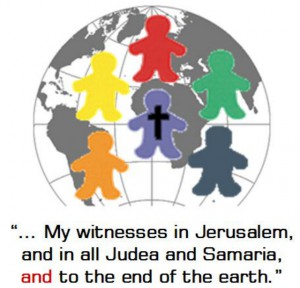6 So when they had come together, they asked him, “Lord, will you at this time restore the kingdom to Israel?” 7 He said to them, “It is not for you to know times or seasons that the Father has fixed by his own authority. 8 But you will receive power when the Holy Spirit has come upon you, and you will be my witnesses in Jerusalem and in all Judea and Samaria, and to the end of the earth.” Acts 1:6-8
For several generations, we American Lutherans have understood missions as work that we do far from home. To us, mission work is “over there.” It’s over in Africa or South America or the former Soviet republics or Asia. We’ve invested time, money, people, and other resources in doing mission “over there.” By God’s grace, our mission work “over there” has borne great fruit – so much fruit that there are now many more Lutheran Christians “over there” than there are here at home.
Everything has changed. America, consistently the great sender of missionaries to the spiritually dark regions of the world, has descended into her own spiritual darkness. Vast numbers of our neighbors, co-workers, and even family members do not know and trust in Jesus Christ as Lord and Savior. A growing number of people in our society have never even heard the Gospel! Researchers have declared that our nation is now the third largest mission field in the world. Yet, we continue to think of mission work as something to do “over there.”
Even though many people have come to faith in Jesus in the other parts of the world, we are right to continue to do mission work “over there.” We should understand Jesus calling His disciples to be His witnesses “in Jerusalem and in all Judea and Samaria, and to the end of the earth” (Acts 1:8) as a call for us to take the Gospel to the whole world starting in our own communities, regions, and nation (our own Jerusalem and Judea) and then extending to foreign nations near and far (our Samaria and the ends of the earth). But, in our response to this call, it appears as though we are leapfrogging Judea.
The extent of Jesus’ call in Acts 1:8 hinges on the conjunction that He uses. He did not say “Jerusalem, Judea, Samaria, OR to the end of the earth” but “Jerusalem, Judea, Samaria, AND to the end of the earth.” He does not want anyone to be excluded, especially those with whom He has placed us in our everyday lives through close proximity. Our nearby neighbor is in just as much need (maybe more) than our unknown neighbors “over there.”
We may say that we understand the “and” of our calling, but our leapfrogging actions and attitudes betray us. We pour our energy and resources into organizing and executing mission trips to foreign countries while neglecting the impoverished regions of our own country. We sponsor and support missionaries to serve the needs of remote villages in distant lands while abandoning the urban centers of America. We generously act with compassion for those in unreached parts of the world while all but ignoring those immersed in America’s spiritual darkness. There are encouraging exceptions, but as a rule we have collectively embraced an “or” understanding of Jesus’ call. We are leapfrogging Judea.
It’s hard to say why we have leapfrogged our Judea. It could be fear or ambivalence or disdain for those around us – or it may simply be our failure to realize how great the need has become in our own backyard. Whatever the reasons, until our passion for mission drives us to turn our attention to the vast spiritual needs of people who live, work, study, and play with us and near us, we will continue to fall horribly short of answering Jesus’ call to be His witnesses both near and far. May He give us the hearts and passion and zeal to respond to the mission field in our own midst. May He move us from the grievous fault of leapfrogging Judea and lead us to discover the joys of sharing His love both “over there” and right here in our own Jerusalem and Judea.
Questions to consider:
- How aware am I of the spiritual needs in my community? Workplace? School? What am I doing about these needs?
- Am I just as concerned about the spiritual well being of my close by neighbors as I am of my distant neighbors?
- In what ways can I be more active in the “and” aspect of Jesus’ call to be His witness nearby and far away?
